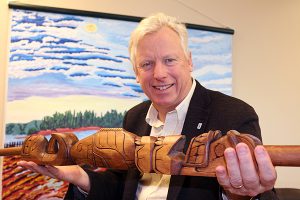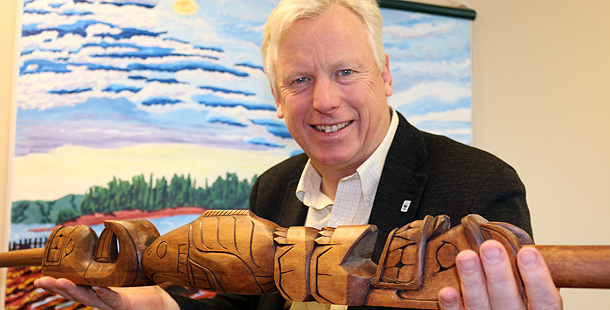
READY TO TALK: Former Toronto mayor David Miller holds the Musqueam talking stick that was given to him during his trip to British Columbia in September.
David Miller sits in his office at the World Wildlife Fund Canada, recalling his brush with British Columbia’s Kermode bear while visiting the Great Bear Rainforest last September.
“I watched the spirit bear, which is a white bear, feed on salmon. It was unbelievable. He was just from here to that … eight to ten metres away, in the middle of a river, and I’m just standing up on small waterfalls.”
The former Toronto mayor was in B.C. to find solutions on how the Northern Gateway pipeline can have destructive consequences on the environment in the area.
“It’s all connected into the ocean, and the salmon,” Miller continues. “And the issue with running a pipeline there is the pipeline could leak, and if it does, it will destroy salmon habitat, which takes a long time to recover. The even bigger risk are the tankers. If a tanker runs into a problem — loses power in an engine — in the big seas and big storms they have there; it’s a very dangerous body of water.”
His passion for nature conservation is why the WWF appointed him their chief executive officer and president, Sept. 3, 2013.
The offices of WWF-Canada are in the heart of midtown Toronto, at Mount Pleasant and Eglinton, where many of the decisions are made on how to handle hot-button issues like the Northern Gateway Pipeline and the overfishing of cod along the Grand Banks. Unlike other non-govermental organizations that focus on raising awareness, WWF is solutions-based; using scientific studies funded by supporters as its weapons.
“The heart of our fundraising is here; the heart of our conservation work, which doesn’t need to be delivered locally,” Miller explained. “Here, we think strategically about where we can make an impact, try to build the resources to do that and we lead the programs.
“Our climate change work is led from this office. Our water work is led from this office. So we would be making decisions about where the money we’re entrusted with by our supporters can make the biggest impact in helping people and nature thrive.”
The 55-year-old with snow-white hair has had three different relationships with midtown Toronto: as a rugby player practising at Sunnybrook Park, as a Toronto city counsellor looking to improve daycare across Toronto, and now as a leader of one of Canada’s most recognized charities.
“We feel like a part of the neighbourhood,” Miller declares of WWF-Canada. “You feel like you’re in the middle of a big city, but three blocks away you feel like you’re more in a small town.
“That’s one of the great strengths of Toronto, of course. You used to be able to walk down George’s Trains, for example; great neighbourhood icons that used to be around.”
Urbanization is just one of three big conservation issues that concern the former Toronto mayor. The other two include are climate change and the aforementioned overfishing of the Grand Banks.
“This is one of the reasons why we’re working on things like sustainable fishing, to help our economic system adjust so it can work in harmony with the environment. If we don’t get ahead of this and create an economic system that ensures that we only consume what the planet can support we’re going to run into more and more problems like the cod.”
But there’s one more issue that mostly goes unspoken.
“We also need to talk about the beauty and majesty of nature,” Miller says. “We want to conserve nature out of self-interest, but there’s also a joy and spirituality and magic to nature.”
As the interview concludes, Miller returns again to his trip to B.C., which offered him moments that were “very magic”, and “very contemplative”.
“Our first day, I think, these two humpback whales breached together, like they were synchronized swimmers, for about half an hour,” he recalls. “Humpback whales don’t do that. Dolphins do that, but humpback whales aren’t known to coordinate their dance. It was extraordinary, and the captain of our ship said he’d never seen that, and he’s been there for years.
“You see that kind of thing, and you think, ‘this is worth preserving.’”
Interview was originally conducted for the Town Crier

